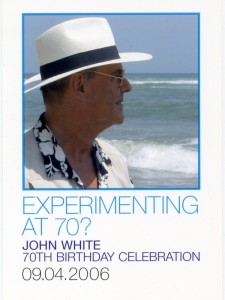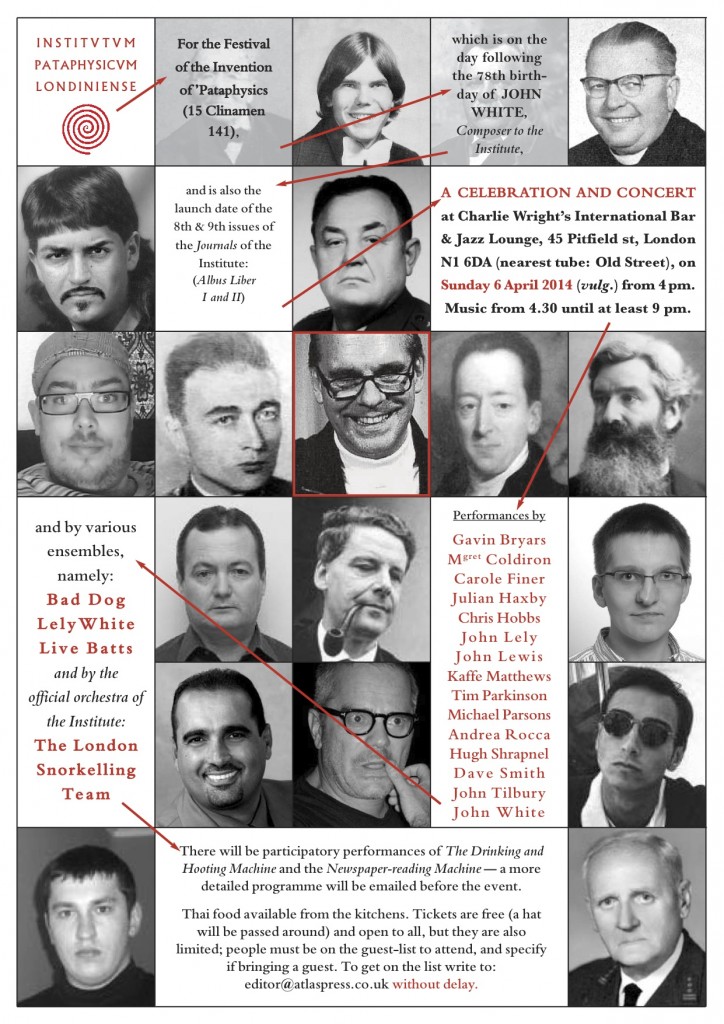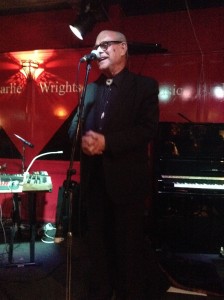For John White’s birthday, the EMC has uploaded two of his pieces by the Hartzell Hilton Band, here: http://bandcamp.experimentalmusic.co.uk/album/wut-again-not-wut-again . But here’s some background information:
John White, now eighty, is a composer whose musical styles and interests are constantly entertaining. Born in Berlin, John was originally considering a career in the visual arts when he attended a performance of Messiaen’s Turangalîla Symphonie and devoted himself to music. “Devoted” is a rather mild term. John thinks musically and works out those purely musical thoughts in a series of piano sonatas which he has kept, like a diary, since 1956. Most of the nineteenth and early twentieth-century piano composers (Medtner, Alkan, Busoni, Schumann, Satie, Reger) make appearances in his sonatas, but so too do experimental techniques, folk and pop music. This body of music alone is astounding — a marathon performance of many of these sonatas formed his seventieth birthday party at Wilton’s Music Hall in 2006 [see poster].

But wait, there’s more: for example, his theatre music, ballet and modern dance music (as music director of the Western Ballet Company and Head of Music at Drama Centre, London). John was one of the early influential composers of indeterminate experimental music; he invented systems minimalism; he was an early adopter of small digital synthesizers and computer music. Being an amazingly gifted pianist was not enough; hired by the Royal College of Music to teach composition when he graduated, John soon tired of the systems of exams and quit, teaching himself tuba to a professional standard in six months. On a pre-publication performance of Cardew’s Treatise, John chose a “perverse” interpretation, playing all rising lines as descending notes, and so on, an act that changed Cardew’s thinking about Treatise and notation. This experience led to the Machine Letters, a correspondence between John and Cardew before the premiere of John’s Cello and Tuba Machine (1968), which took up much of the first meeting of Cardew’s Experimental Music class at Morley College, London, a course that led to the formation of the Scratch Orchestra. Machines? John White invented these process systems of repetitive minimalism, using all sorts of random means — knights’ moves, dart throws, random number tables, telephone books. And if one were looking for early repetitive process music, John wrote a carillon piece using such a system in 1962. He was an innovator in several unique genres, including “Gothic” music (heavy, pounding minimalism), and, with Chris Hobbs, strict systems, in which number systems determined the note-to-note procedure in repetitive minimalism. John founded numerous ensembles: the Composers’ Ensemble, with his former students, William York and Brian Dennis; the Promenade Theatre Orchestra (PTO), with Chris Hobbs, Alec Hill, and Hugh Shrapnel; the Hobbs-White Duo; the Garden Furniture Music Ensemble, with Dave Smith, Gavin Bryars, and Ben Mason; and more, including the Farewell Symphony Orchestra, Live Batts!!!!, and Lelywhites (with John Lely).
John White is perhaps the greatest musical thinker, and the most inventive, arguably the greatest composer I have ever known. Any time spent with him is an education; any time spent with his music is a revelation. So why isn’t John White celebrated more in British music, in the world? For one thing, John never advertises himself or “bigs up” his music for career purposes. For another, his work goes against all the standards for being a big-name composer. Rather than always sticking to serious, weighty issues like most careerist composers, John’s pieces are often laugh-out-loud funny. Rather than writing the great opera or, as John called it, the “cosmological symphony”, John’s pieces can be short. He quite happily will write for instruments that are, let us say, not noble: bottles, jaw’s harps, toy pianos, tenor horn, tuba, viola, and well, my favourite, E-flat clarinet. Instead of a major university electronic studio, Live Batts!!! used the cheapest portable battery-operated synths and amps. This is one of the joys of listening to John White’s music—you will often hear instruments and instrumental combinations that “square” concert music composers would never consider. In 1985, his more formal fiftieth birthday concert had been panned by the critic Paul Griffiths, in part for what Griffiths called the “appalling instrumentation” in the Garden Furniture Music Ensemble (tenor horn, tuba, viola, and piano).

Much of John’s music recalls Satie in this respect: little pieces working out some kind of musical problem, often in the quirkiest manner. The Institutum Pataphysicum Londiniense—the Institute of ‘Pataphysics—mounted a celebration of John’s life and work for his 78th birthday, at Charlie Wright’s International Bar in London [see poster]. They also put out two issues of their journal, the Albus Liber I and II, edited by Dave Smith, to celebrate. Somehow, the venue suited John’s temperament better than the typical South Bank celebration, and the fact that they chose 78, rather than 80, for the big party was also fitting, because John does things differently. And in being different, there lies what is interesting, fascinating, thought-provoking, and fun.

*******
In celebration of his eightieth birthday, we have uploaded two pieces onto our Bandcamp page that John White wrote for the Hartzell Hilton Band: WUT Again? and NOT WUT AGAIN! (no way, shitface!). And here’s a story. The Hartzell Hilton Band came about when I met Jane Aldred, when she was playing E-flat clarinet at the South Bank for a birthday celebration for the composer Paul Patterson—just the kind of “normal” birthday concert a “serious” composer should have. We got to talking about how we loved playing E flat, and the way that it wasn’t featured on this concert for its unique timbre. Two friends, Michael Newman and Karen Demmel, played viola. I really wanted to go one step farther. E flats and violas: they seemed like the perfect chamber music ensemble, the next step forward from the string quartet! We added Chris Hobbs on piano, and Simon Allen on vibes and other percussion. We asked a bunch of composers to write for our group, including Michael Parsons and John White.
John had already written two pieces, called WUT? and Not WUT. In those days I talked to John a lot on the phone and in person and house-sat when he and his then-partner, Pat Garrett, went on holiday, so I heard quite a bit about John’s music and musical thinking. The WUT actually came from a direction in Mahler, “mit wüt”, or “with rage”. But at the time a variant of the Los Angeles “Valley Girl”, the “Essex Girl”, had sprung up, a forebear to most current reality shows. I cannot remember whether John had imagined what such a creature would make of “mit wüt” in her Estuary English, or whether he had such a student, but the response to this direction was, “with WUT?”, pronounced, as we put on the programme, to rhyme with “butt”. WUT Again? has elements that are consistent with WUT?; NOT WUT AGAIN! is, like Not WUT, an un-WUT-like piece. But there is more to this wordplay. The exclamation point and all-caps in NOT WUT AGAIN! arose from a conversation we had while John was writing the piece. I thought that it could be a cry of exasperation at yet another WUT piece: “WUT…again?” and “Oh, not WUT again!!”. This name then somehow got entangled with another topic of our conversation, American slang. John liked American slang. We had gone through some of the intricacies of certain phrases (Jack Shit? Does anybody have any, if you ain’t got Jack Shit?). One of them was the incredulous interjection, “No way, shitface!”, so John tagged that onto the title. John generously dedicated these two pieces to me and the Hartzell Hilton Band.
And that’s what we’ve uploaded, the 4th of July concert at Lauderdale House in 1988. I had advertised the concert with the fake-cowgirl promise that yee-haw, we’d be celebrating Independence Day by not playing any American music (we played a piece by Barney Childs, but he was a Rhodes Scholar at Oxford, so he didn’t count as American for the day). You can hear the pieces, so there is no need to go into them in detail, other than they are really lovely, and fun to play. WUT Again? has an unusual eight-bar rest — the track hasn’t dropped out, before recommencing with what turns out to be the coda. This rest is performed, or was performed by us being still and in performance mode, before the cue to resume. It’s deeply effective. Just after John wrote this piece, the earlier of the two Hartzell WUTs, I attended a composition workshop at the Huddersfield Music Festival. The leader of the group berated a composer for putting in a three-bar rest for the whole ensemble. I found this amusing and, in the general discussion of the piece, offered the example of WUT Again?, suggesting that perhaps the composer should put in a longer rest in his piece as well. NOT WUT AGAIN! (no way, shitface!) opens with the kind of action music that John had equated with radio serials such as Dick Barton, Special Agent (there is one such passage in one of his little Symphonies). This is absolutely one of the loveliest things for an E-flat clarinet to play, and is followed by a shift to the most gorgeous aspirational passages in John White’s work. It’s like the sun rising. Is this ironic as well? I prefer not to ask and instead enjoy the irony that something as beautiful as this has such a silly title. Now go listen to these pieces, here: http://bandcamp.experimentalmusic.co.uk/album/wut-again-not-wut-again Transferred from a cassette recording, they are not as “clean” as the pieces deserve, but they represent the occasion very well. And, speaking of occasions, Happy Birthday, John! and many, many more!

Happy Birthday and always THANKS for your music, Mr. John White!
Greetings from Canada.
I am searching for a score to “Cello and Tuba Machine” by John White.
Can you assist?
With thanks,
Scott Whetham, Bass Line Road (ensemble)
CANADA
Hi there! We don’t have it on our catalogue list, but we will check and get back to you privately. In the meantime, the tuba music we do have is by Dominy Clements (see the Instrumental Catalogue). Also Warwick Music ( http://www.warwickmusic.com ) has a piece for tuba by John White and Chris Hobbs’ Twelve Sketches for tuba.